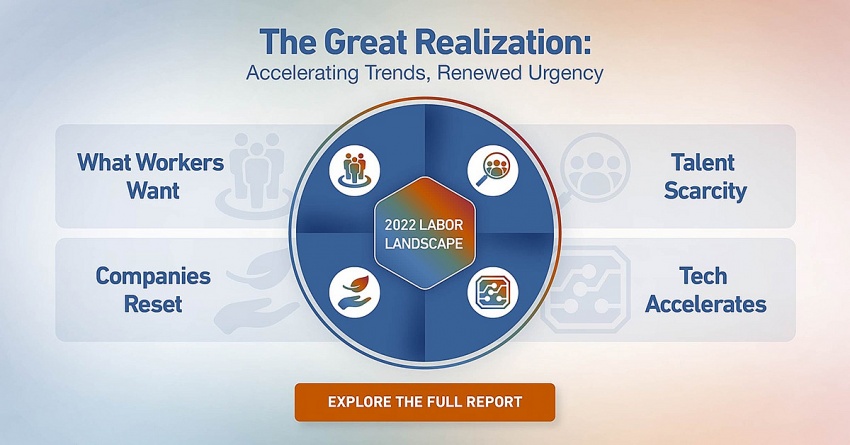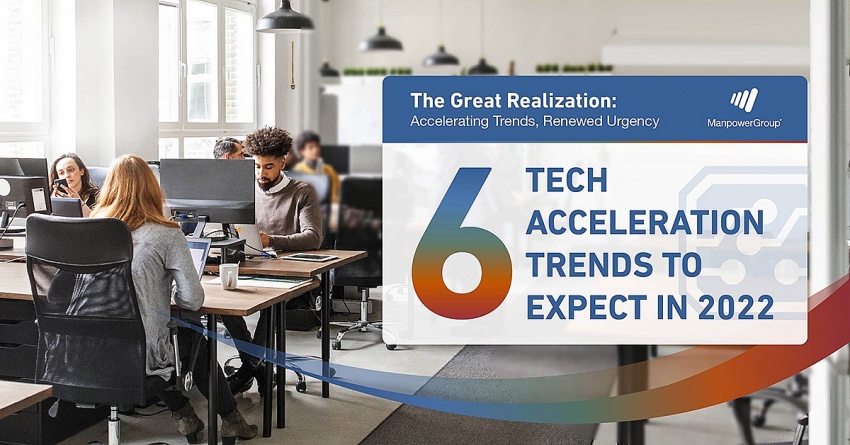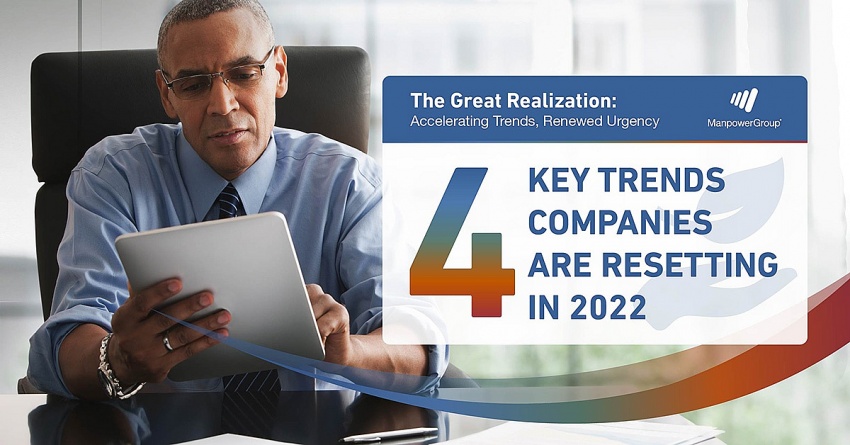Accelerating trends and renewed urgency for labour
 |
| The Great Realisation - Accelerating Trends and Renewed Urgency |
The report titled The Great Realisation: Accelerating Trends and Renewed Urgency identifies the top 20 trends that will shape the world of work this year and beyond.
The report says the impact of the pandemic combined with the acceleration of digital transformation will continue to have profound effects on global labour markets. ManpowerGroup’s data, insights, and global relationships with clients, candidates, and partners reinforce that the structural changes and trends we have predicted for some time continue to accelerate, but with even greater urgency.
The top 20 trends mapped out in the report fall into four big movements of the labour landscape this year: What workers want, talent scarcity, the acceleration of technology, and companies resetting. Each trend reveals valuable insights and suggests desired actions that employers and staff should take in order to respond to the changes and win in the world of work.
 |
Now, perhaps more than ever, people want their employers to offer more. They want their mental health and well-being prioritised, while also looking for purpose, flexibility, competitive pay, good working conditions, and skills development.
Additionally, many people also expect a stronger stance from their employers on socio-economic issues. With nearly half of all workers saying they would move to an organisation for better well-being, if a current employer fails to check the boxes their employees are looking for, they run the risk of people leaving for better working environments in more progressive companies.
Jonas Prising, ManpowerGroup chairman and CEO shared, “The post-pandemic hiring recovery that has been underway for some time will continue to carry momentum with employers predicting strong demand for talent across key sectors. The battle for talent is increasingly more challenging with nearly 70 per cent of employers reporting they cannot recruit enough people with the skills they need as a global talent shortage continues to impact organisations around the world."
"Meanwhile, 58 per cent of all employees will need new skills to get their jobs done. Shifting demographics including shrinking birth rates, reduced mobility across borders, and the rise in people opting to retire earlier than anticipated means talent is becoming increasingly scarce. Businesses must now be even more creative to recruit, retain, reskill, and upskill top talent," he added.
Investment in digitalisation has accelerated, with more than 80 per cent of organisations increasing their efforts as a result of the pandemic. Consumers and employees alike now expect technology to make the way they live and work easier. With this shift, there is a new urgency for organisations to upskill their people so they can translate data into insights, make data-driven decisions, and combine the best of human and machine learning for new value creation.
The pandemic laid bare several harsh realities for companies that had become too reliant on others to keep their operations running smoothly. In fact, 83 per cent of organisations believe they need greater speed and agility to better cope with change. As a result, companies are becoming increasingly sophisticated, transforming the way they do business and seeking nimbler operating models.
They need more resilient supply chains, greener options, and more consolidated partners and solutions in response to heated competition, unpredictability, and greater transparency.
 |
While these topic areas and the respective trends within each are not new, they have taken on a renewed urgency. These 20 trends represent the tipping point for what we see on the horizon in terms of how businesses around the world will need to evolve and adapt in order to operate in this new era.
What the stars mean:
★ Poor ★ ★ Promising ★★★ Good ★★★★ Very good ★★★★★ Exceptional
Related Contents
Latest News
More News
- Green jobs needed as businesses embrace sustainability (April 06, 2023 | 11:24)
- HR leaders urged to handle work management in global uncertainty (October 20, 2022 | 17:07)
- Facing the biggest HR challenges in 2022 (October 10, 2022 | 12:14)
- Solving talent shortages amid fierce human capital landscape (August 26, 2022 | 16:18)
- Employers expect hiring to increase in H2 (August 13, 2022 | 21:30)
- Stakeholders seek sustainable strategies to retain workers (June 21, 2022 | 17:54)
- Latest HR trends in logistics revealed (April 28, 2022 | 14:38)
- Sustainable employment under digital transformation and the pandemic (October 29, 2021 | 15:04)
- Employment security and the future of skills for Vietnamese workers in digital transformation (October 26, 2021 | 17:20)
- Strengthening businesses’ immune system prior to economic reopening (September 29, 2021 | 13:58)

 Tag:
Tag:

























 Mobile Version
Mobile Version